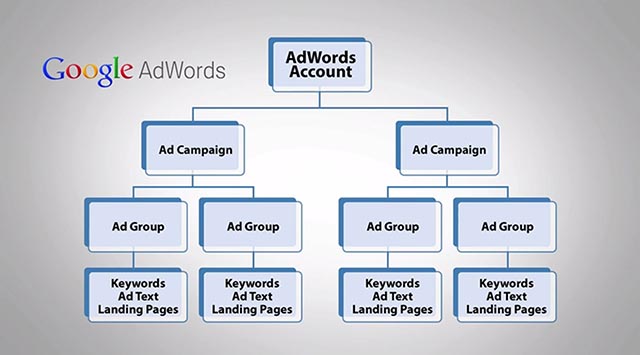We all know that Ads is a proven online marketing tool for eCommerce sites that can instantly drive potential customers to your site, but there’s much more to a successful campaign. The key is to plan and develop cost-effective strategies. First let’s take a look at the structure of an Ads account for an eCommerce site…
The Structure of your Google Ads Account

• You can have multiple campaigns in your account.
• You can group relevant keywords and ads in ‘ad groups’.
• Each ad can direct potential customers to relevant landing pages.
Your main focuses when planning your AdWords campaign for your eCommerce site should include:
• Budget – Choosing an appropriate daily budget and cost per click that provides your site with maximum exposure for minimum cost.
• Campaigns and Ad Groups – Creating tightly related campaigns and ad groups based around your products.
• Keywords – Selecting relevant keywords that your target market use when looking for products like yours.
• Ads – Creating engaging ad copy with unique selling points
• Landing pages – making sure your pages go to closely relevant and high quality pages
Planning Your Campaign
In order to create a tailored AdWords plan for your business you need to decide what products you want to sell and then compile a list of the different styles, brands, types etc.
Next you need to figure out what your company’s USPs or Unique Selling Points are; it could be free shipping, free returns or price matching.
You will also consider what your ideal target market is. Whether it is women, men, teenagers or specific industries, it is extremely important to understand who you are targeting so you can create ads that will engage them while they’re searching for products like yours.
How to Set Your Budget
You then need to construct a daily budget which will determine how much you would like to spend each day for advertising. Your budget plays an important role in the success of your AdWords campaign as it influences how often your ads are displayed when someone searches for your selected keywords and the number of clicks you receive.
Keep in mind that while you should select a budget that you are comfortable with, you should also take into consideration your goals and the search volume and average cost per click of the keywords you want your ads to appear for when deciding this.
What are Your Campaign Goals?
Creating goals for your AdWords campaign is a good way to track its effectiveness. You’ll need to figure out what your sale targets are and what each click and sale is worth to your website. This will you understand what your max cost per click and acquisition should be.
Even with a website that is optimised for conversions and a well optimised AdWords campaign, it’s only natural that not every click your ads get will result in an instant sale, so it’s important you remember this when you are calculating how much you pay per click.
Choosing the Right Keywords
Keyword research is the most important aspect of an AdWords campaign. You need to think about the different product categories on you website, the words used to describe your products, and the keywords and phrases your customers use to describe your products.
The Google AdWords Keyword Planner will assist you with identifying how much traffic each keyword gets, and the approx. cost per click. It will also give you some ideas on similar keywords that will help you grow your list.
It’s a good idea to start grouping related keywords into different categories and subcategories or what AdWords call “campaigns” and “ad groups”. For example, if you are an online sports equipment retailer that sells boxing gear you could create a “boxing gear” campaign. Then if you had keywords like “boxing gloves” and “gloves for boxing” in a “boxing glove” ad group with an ad specific to boxing gloves. In the same way, you could set up more closely targeted ad groups for other types of boxing gear, such as “boxing boots” or “hand wraps” with relevant ad copy within the same campaign.
Structuring your AdWords account in this way help you keep it nicely organised with campaigns and ad groups with keywords that are closely related. This will also help you achieve higher quality scores (Google’s rating of the quality and relevance of your AdWords) which in turn will reward you with higher ad rankings and lower costs.
Competitor Research
Competitor research provides you with a good insight on what keywords you should target. You should also examine which keywords your successful competitors are focusing on — your research may uncover valuable keywords you hadn’t thought to target! Not only will it help you find out what keywords your competitors are targeting but it will also give you the opportunity to create ads that really stand out!
Landing Pages
An engaging landing page has the power to convert your customers, get traffic to your website and generate enquiries and sales. Ensure the pages your visitors are taken to are of high quality relevant to the ad and satisfies the customers pursuit. An effective landing page is crucial to the image of your business.
Wrapping Up
So now let’s recap what you need to do before you launch your AdWords campaign. Take the time to carefully plan the set-up by understanding your business’s brand image, products, USP’s and target market. Figure out your sales targets aligned with your budget and the maximum cost per click you want to spend. Conduct keyword and competitor research ensuring you use keywords that target customers who are in the buying stage. Lastly, create and optimise high quality landing pages that are relevant to the ad and satisfies the customer’s pursuit.
At Digital Animals, we are a Google Certified Partner and have expert AdWords management skills from the planning stage to the launch and management of your AdWords account. Call us today and see how we can help you achieve your AdWords goals.
About Author: Hayley Jennings is one of our digital marketing specialists at Digital Animals and is passionate about helping clients get in front of their competitors and target customers using strategic AdWords campaigns. Digital Animals is a great source of information and has the capability to help you at every step of the online marketing process. Please get in touch, we are happy to answer any questions you may have.







